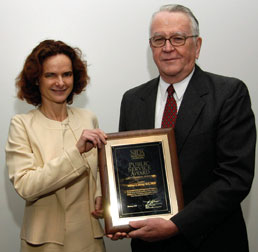NIDA Honors Dr. William L. Dewey
 NIDA Director Dr. Nora D. Volkow presents the NIDA Service Award to The Friends of NIDA creator Dr. William L. Dewey.
NIDA Director Dr. Nora D. Volkow presents the NIDA Service Award to The Friends of NIDA creator Dr. William L. Dewey.Director Dr. Nora D. Volkow presented a NIDA Public Service Award to Dr. William L. Dewey at NIDA's National Advisory Council meeting on February 8. The Institute recognized Dr. Dewey for creating The Friends of NIDA—a private group that raises public awareness about the critical role of science in eliminating addiction and its consequences. Dr. Volkow praised Dr. Dewey's vision as founder of the organization and acknowledged his contributions to the field—including research on endogenous opioids and cannabinoids and opiate addiction, leadership of scientific organizations, and mentoring. The Friends of NIDA sponsors educational briefings for Congressional staff, committees, and caucuses on critical topics, including drugs and crime, methamphetamine addiction and its treatment, and prescription drug abuse. The organization builds support for bringing the power of science to bear on addiction as a brain disease (see www.thefriendsofnida.org).
HHS and NIH Recognize NIDA Staff
- On June 29, NIDA's Redonna Chandler, Ph.D., and Harold Perl, Ph.D., received HHS Secretary's Awards for Distinguished Service. Drs. Chandler and Perl were honored for their deployment to New Orleans following Hurricane Katrina, and for providing increased capacity for mental health and substance abuse treatment services following Hurricanes Katrina, Rita, and Wilma.
- On July 12, NIH Director Dr. Elias Zerhouni presented the annual Director's Awards to NIH staff. The following were recognized for their contribution to NIDA's mission in the past year:
- Lisa Onken, Ph.D., for her outstanding contributions to the development and advancement of the behavioral treatment program within NIDA.
- Donna M. Jones, in recognition of outstanding leadership and dedication that has advanced the mission of NIDA.
- David Anderson, Timothy P. Condon, Ph.D., Gayathri Dowling, Ph.D., Jennifer Elcano, Lynda Erinoff, Ph.D., Mark Fleming, Jan Lipkin, Sheryl Massaro, Lucinda Miner, Ph.D., Joan Nolan, Jacques Normand, Ph.D., Michelle Person, Anna Staton, Susan Weiss, Ph.D., and Sara Wilson, in recognition of their roles in creation of the HIV Public Education Campaign, "Drug Abuse and HIV: Learn the Link."
- Jonathan Pollock, Ph.D., for outstanding leadership in the planning and development of the trans-NIH Knockout Mouse Project.
- Barry Hoffer, M.D., Ph.D., for exemplary performance while demonstrating significant leadership, skill and ability in serving as a mentor.
- Laurence Stanford, Ph.D., for outstanding performance on the NIH MRI Study of Normal Brain Development, creating a database of normal brain development as a resource for developmental neuroscience communities.
ATLAS and ATHENA Prevention Programs Receive First Sports Illustrated Champion Award
 L-R: Dr. Linn Goldberg, Oregon Health and Science University (OHSU); Dr. Elizabeth Robertson, NIDA; Dr. Diane Elliott, and Dr. Esther Moe, also OHSU, at the SI Champion Award ceremony.
L-R: Dr. Linn Goldberg, Oregon Health and Science University (OHSU); Dr. Elizabeth Robertson, NIDA; Dr. Diane Elliott, and Dr. Esther Moe, also OHSU, at the SI Champion Award ceremony.Two NIDA-supported programs that prevent steroid and drug abuse and promote healthy behavior among high school athletes have been honored with Sports Illustrated (SI) magazine's first Champion Award. The ATLAS (Athletes Training and Learning to Avoid Steroids) and ATHENA (Athletes Targeting Healthy Exercise and Nutrition Alternatives) programs were developed by Dr. Linn Goldberg and Dr. Diane Elliot at the Oregon Health and Science University.
SI President Mark Ford announced the award on February 8, and disclosed that over the next year, SI will provide $1 million in support for the programs, including grants to establish SI Schools to serve as models. SI also will create a Web site that focuses on science-based nutrition, exercise, and drug prevention for coaches, athletes, and trainers. The SI Champion Award will be given annually to a nonprofit organization working for the betterment of sports.
ATLAS and ATHENA are the only prevention programs specifically designated as model curricula in the U.S. Anabolic Steroid Control Act of 2004. ATLAS was designed to help male athletes avoid steroid use and develop healthy approaches to training and physical development. ATHENA promotes exercise and nutrition as alternatives to reliance on diet supplements or unhealthy approaches to conditioning and weight control or dieting. Both programs use student athletes as leaders for team-centered instruction (see "ATHENA Program Reduces Substance Abuse by Girls on High School Sports Teams," NIDA Notes, Vol. 20, No. 1).
